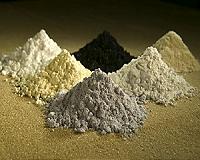| . |  |
. |
New Delhi (AFP) Dec 21, 2010 Russia and India on Tuesday signed a pact worth up to 30 billion dollars on the development of a fifth-generation fighter aircraft and agreed to pursue a deal to build two Russian nuclear reactors. The agreements surrounded talks in New Delhi between visiting Russian President Dmitry Medvedev and Indian Premier Manmohan Singh, during which both sides set a target of doubling bilateral trade to 20 billion dollars by 2015. Medvedev arrived in India on Tuesday, seeking to fend off growing international competition for lucrative Indian defence contracts that were once monopolised by Moscow. His trip capped a flurry of top-level diplomatic activity that has seen the leaders of all five permanent members of the UN Security Council beat a trade-focused path to India's door over the past six months. British Prime Minister David Cameron was here in July, and US President Barack Obama, French President Nicolas Sarkozy and Chinese Premier Wen Jiabao have passed through over the last six weeks. All the visits have secured deals and framework agreements worth billions of dollars, and the Russian president was also looking to seal key accords on the supply of fighter jets. Traditionally India's default defence supplier, Russia faces stiff competition from Europe and the United States as India diversifies its sources of military hardware and becomes more demanding over pricing and quality. The meeting with Singh witnessed the signing of a contract on the joint design and development of fifth-generation fighter aircraft with stealth capabilities. Although no figures were mentioned, the final deal could be worth close to 30 billion dollars, with India planning to induct up to 300 of the aircraft into its air force. The two sides also agreed to pursue plans for Russia to build two additional generating units at a nuclear power plant in the southern Indian state of Tamil, where it is already setting up two reactors. Energy-hungry India is one of the world's biggest markets for nuclear technology with plans to reach a nuclear power capacity of 63,000 megawatts by 2032, from the current level of 4,560 megawatts. Hailing what he described as a "special and privileged" strategic partnership, Singh said Russia was a "time-tested friend ... that has stood by us in our times of need in the past." In a remark that will play well with his hosts, Medvedev voiced Moscow's support for India "as a deserving and strong candidate" for a permanent seat in an expanded UN Security Council. As well as bilateral issues, the two leaders discussed regional security and agreed to deepen cooperation in stabilising Afghanistan and confronting terrorism. "Those who hide terrorists hide criminals. No modern civilised state can hide terrorists," Medvedev said. He made no specific mention of India's arch-rival Pakistan, which Delhi accuses of harbouring militant groups like Lashkar-e-Taiba -- blamed for the November 2008 attacks on Mumbai. Medvedev was also expected to use his visit to lobby India to select Russian-made MiG-35s for a 12-billion-dollar contract for 126 fighter jets. European and US aeronautical giants including Dassault Aviation, Boeing Co. and Lockheed Martin Corp. are also bidding for the tender. Wary of China's military modernisation drive, India is embarking on what global consultancy firm KPMG has described as "one of the largest procurement cycles in the world". Between now and 2016, India's defence sector is expected to spend 112 billion dollars on capital defence acquisitions, KPMG said in a recent report. New Delhi and Moscow enjoy close ties that date back to the 1950s and analysts say Russia retains a competitive edge as an old ally even as India looks to build new strategic partnerships.
Share This Article With Planet Earth
Related Links Global Trade News
 US to China: Don't use rare earths as 'weapon'
US to China: Don't use rare earths as 'weapon'Washington (AFP) Dec 20, 2010 The United States called for China not to use controls over lucrative rare earth metals as a "weapon," concluding that Beijing likely curbed exports to Japan due to political reasons. China produces more than 95 percent of rare earth products, which are critical to manufacturing 21st-century goods from iPods to low-emission cars to wind turbines. "All we're asking for is that they not us ... read more |
|
| The content herein, unless otherwise known to be public domain, are Copyright 1995-2010 - SpaceDaily. AFP and UPI Wire Stories are copyright Agence France-Presse and United Press International. ESA Portal Reports are copyright European Space Agency. All NASA sourced material is public domain. Additional copyrights may apply in whole or part to other bona fide parties. Advertising does not imply endorsement,agreement or approval of any opinions, statements or information provided by SpaceDaily on any Web page published or hosted by SpaceDaily. Privacy Statement |